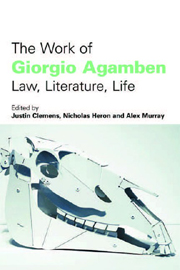Book contents
- Frontmatter
- Contents
- Acknowledgements
- Notes on Contributors
- The Enigma of Giorgio Agamben
- 1 K
- 2 Integral Actuality: On Giorgio Agamben's Idea of Prose
- 3 The Role of the Shifter and the Problem of Reference in Giorgio Agamben
- 4 ‘Its Silent Working was a Delusion’
- 5 Politics and Poetics of Divine Violence: On a Figure in Giorgio Agamben and Walter Benjamin
- 6 Idea of Poetry, Idea of Prose
- 7 The Fading Memory of Homo non Sacer
- 8 Soulblind, or On Profanation
- 9 Face to Face with Agamben; or, the Other in Love
- 10 Beyond Spectacle and the Image: the Poetics of Guy Debord and Agamben
- 11 Dismantling Theatricality: Aesthetics of Bare Life
- 12 Notes on Media and Biopolitics: ‘Notes on Gesture’
- Index
The Enigma of Giorgio Agamben
Published online by Cambridge University Press: 12 September 2012
- Frontmatter
- Contents
- Acknowledgements
- Notes on Contributors
- The Enigma of Giorgio Agamben
- 1 K
- 2 Integral Actuality: On Giorgio Agamben's Idea of Prose
- 3 The Role of the Shifter and the Problem of Reference in Giorgio Agamben
- 4 ‘Its Silent Working was a Delusion’
- 5 Politics and Poetics of Divine Violence: On a Figure in Giorgio Agamben and Walter Benjamin
- 6 Idea of Poetry, Idea of Prose
- 7 The Fading Memory of Homo non Sacer
- 8 Soulblind, or On Profanation
- 9 Face to Face with Agamben; or, the Other in Love
- 10 Beyond Spectacle and the Image: the Poetics of Guy Debord and Agamben
- 11 Dismantling Theatricality: Aesthetics of Bare Life
- 12 Notes on Media and Biopolitics: ‘Notes on Gesture’
- Index
Summary
Justin Clemens, Nicholas Heron and Alex Murray
The more clearly mathematics demonstrate that the total elimination of the problem of representation – which is boasted by every proper didactic system – is the sign of genuine knowledge, the more conclusively does it reveal its renunciation of that area of truth towards which language is directed. The methodological element in philosophical projects is not simply part of their didactic mechanism. This means quite simply that they possess a certain esoteric quality which they are unable to discard, forbidden to deny, and which they vaunt at their own peril.
Walter BenjaminWhat sense, in fact, would there be to an inspired philosophy, unless it were possible to find something like a Muse of philosophy, unless it were possible to find an expression which, like the song of that most ancient of muses the Thebans called the Sphinx, would shatter to pieces in the very moment it unveiled its truth.
Giorgio AgambenEvery true philosopher introduces something new into the world, perhaps even a new world. This novelty is an essential phenomenon, not simply an accident or by-product of philosophy. As such, it cannot quite be evaluated, for no existing mode of thought is able to account fully for its emergence, its enunciation, its elaboration. Novelty is untimely, inasmuch as it irrupts into already established habits of thought, deranging or diverting customary modes of attention and expression, their rhythm and composition.
- Type
- Chapter
- Information
- The Work of Giorgio AgambenLaw Literature Life, pp. 1 - 12Publisher: Edinburgh University PressPrint publication year: 2008



